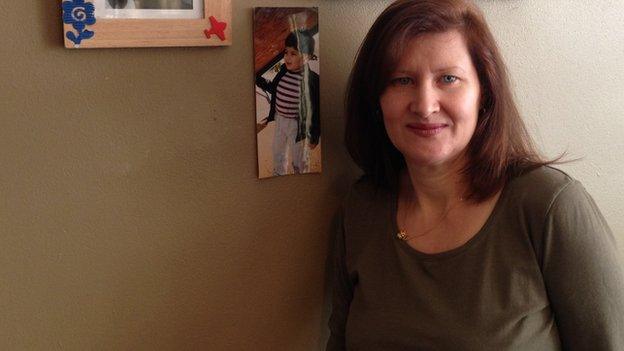Psychiatric care is 'robbing us of a family'
- Published

Leo Andrade says having her son cared for miles away from her home has caused her great distress
A report into care for people with learning disabilities says they are being failed by the government, because they are often kept in institutions far from home for too long. One mother explains how her family has been affected.
Leo Andrade's 19-year-old-son Steven has severe autism as well as attention deficit hyperactivity disorder.
He was sent to St Andrew's psychiatric hospital in Northampton last year. Mrs Andrade, who lives in Islington, London, claims she had little choice in the matter and continues to feel as if she has no say in her son's care.
She says the journey to and from Northampton every weekend often takes up to four hours - and that she is only allowed to be with Steven for an hour at a time.
"The distance is about 80 miles away - it takes hours to get there," says Mrs Andrade, who is married with two other children.
"Every Sunday we should see Steven - but it's not happening presently.
"I haven't seen him for three weeks. On one occasion I didn't see him for three months because the hospital said I was disrupting him."
The difficulties she is facing mean she has "no trust whatsoever in the system".
"I do not want my son again in any other institution. I also find the idea that having my son away from us is robbing us of having a family."
Christmas cancelled
St Andrew's hospital says it provides care for some very vulnerable people and "can give reassurance that it does everything it can to provide the most appropriate care in the best possible environment".
A report commissioned by NHS England, following the abuse scandal at Winterbourne View care home in Bristol, is calling on the government to give people like Steven - and their families - more rights.
The BBC's Panorama uncovered neglect and abuse of patients by staff at the Winterbourne View private hospital, near Bristol in 2011. Six people were jailed in 2012 and five given suspended sentences as a result.
The authors of the "Winterbourne View - Time for Change" report want those receiving care and their families to be able to challenge the system if they wish to.
Mrs Andrade welcomes the report, but is concerned that the implementation of the recommendations will not be so easy, suggesting decision makers often shy away from risky decisions which ultimately could make a big difference.
For her, Christmas will never be a time to celebrate unless her son is close to home - and happy.
"We don't do Christmas. I had a dining room here - I took it away because it was too difficult to sit down at the table and my son is not there.
"My family is broken. My son's only crime is autism."